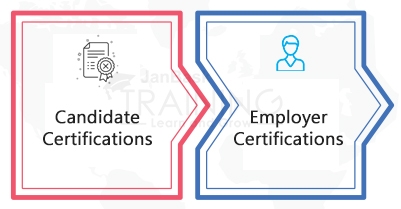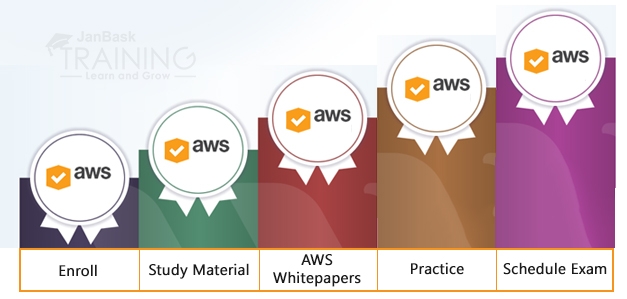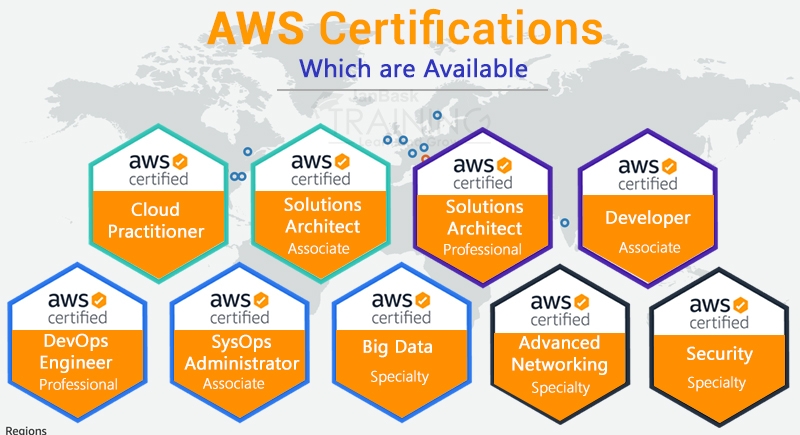16
JanNew Year Special : Get 30% OFF + $999 Study Material FREE - SCHEDULE CALL
Companies are increasingly shifting their workloads on the public cloud as cloud computing has moved to the level of core competency. This large shift requires new skills-set for designing, using, and managing the applications in the sphere of cloud computing. Amazon Web Services is regarded as the most matured and market leader in the cloud computing space. It also acts as a point of reference for many of its competitors. Thus, as many global big businesses constantly move to adopt or migrate to AWS, the relevance to upskill yourself is even enhanced for the system architects, developers, and even operators.
As an IT professional, if you are looking at growth or considering a new job, an AWS certification will serve as an important asset for your career. AWS has nine certifications to offer which span both the foundational and specialty topics of cloud computing.
An AWS Certification will clearly mean that you have the most updated and profitable skills which are being validated by all the known entities in the realm of cloud computing. A certification will help you to show a shared understanding of the platform, proper terminology, and a specific level of expertise which will be instrumental in speeding up the time to value for cloud projects. Although the enterprises have adopted multiple cloud strategies, still the importance of AWS cannot be ignored as it still the choice provider for the adoption of the public cloud. The uninterrupted streaming of new services, smooth financial performance, and even a continuous geographic growth is a clear signal that the field is sure to show great progress in times to come.

Candidate Certifications: AWS certifications for candidates are known for their thoroughness and rigor when it comes to evaluations. The prime focus is on hands-on experience and other kinds of best practices. If you are working with AWS, then the certifications will help to clarify your concepts further and enhance your knowledge. In case if you are new to it, then it will give you the foundational knowledge and other skills which are needed to work with the AWS even later. For a candidate, the certifications act as a validation of his knowledge and familiarity with the architecture, management, and even security of the cloud.
Read: Top 10 Cloud Computing Books Recommended By Experts
Employer Certifications: For any firm, the basic training materials which are needed for the AWS certifications are a highly important part of the firm’s own training schedule. There are many firms which are into building their own materials for training. Many companies are also using the vendor training paths in parallel with their own internal training materials to design certification tracks, which are highly specific to their business needs.
An AWS certification, along with a full-time job and other life commitments, with taking 80 hours of study, will be complete in approximately two months. In case you are completely new to AWS, it is suggested that you should put at least 120 hours in almost three months for the preparation. You should essentially start with the fundamentals and then proceed to the Solutions Architect Associate Learning Path.
There is no prescribed or outlined process to get the certifications, but here are a few steps which make the process smoother and streamlined.

Read: How to Delete AWS Account?
There are nine certifications which are available of which three are associate-level certifications, three are professional-level certifications and three are specialty certifications. These are as follows:

Taking up each in detail:
Read: Is the AWS Big Data Certification Worth It? Learn How to Pass Certification In First Attempt
Conclusion
Thus, the AWS certifications hold the key to a bright future in IT as most of the companies are shifting to the cloud. Almost all certifications need practical experience along with sound preparation of the training material. An AWS Certification means that you have the most updated and in-demand skill set, which is validated by all the companies who operate in the realm of cloud computing.
 Pinterest
Pinterest
 Email
Email
The JanBask Training Team includes certified professionals and expert writers dedicated to helping learners navigate their career journeys in QA, Cybersecurity, Salesforce, and more. Each article is carefully researched and reviewed to ensure quality and relevance.

Cyber Security

QA

Salesforce

Business Analyst

MS SQL Server

Data Science

DevOps

Hadoop

Python

Artificial Intelligence

Machine Learning

Tableau
Search Posts
Related Posts
Receive Latest Materials and Offers on AWS Course
Interviews